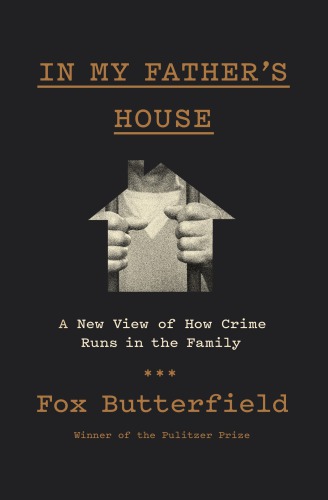
In My Father's House
A New View of How Crime Runs in the Family
کتاب های مرتبط
- اطلاعات
- نقد و بررسی
- دیدگاه کاربران
نقد و بررسی

August 1, 2018
A follow-up of sorts to All God's Children, the author's 1995 book about an African-American family mired in multiple generations of imprisonment. This time, the author chronicles a "a white family with a sizable number of inmates to illustrate this perverse legacy while removing race as a factor in the discussion."Based on an extraordinary research effort that combined years of building trust with outlaws as well as searching law enforcement records, longtime New York Times reporter and bureau chief Butterfield, who won the National Book Award for China: Alive in the Bitter Sea (1982), located at least 60 members of the extended Bogle family who have been arrested and sentenced beginning in the early 1920s. Although 60 may seem like an extraordinarily large number, "some oddity out of Ripley's Believe It or Not," the author notes that roughly five percent of families account for approximately half of all crime in the United States. While fascinated with the Bogles, Butterfield never loses sight of a significant question: Why is the intergenerational transmission of violence so powerful in countless specific families? Though the Bogles don't necessarily present a simple answer to the author's inquiry, he learned that numerous Bogle fathers and mothers encouraged their children to choose a life of crime, usually at the expense of education. Being sent to prison was viewed by Bogle family members as a rite of passage, even an honor. Certainly for some Bogle crime careerists, prison served as a school for honing skills to become more skilled robbers and burglars. (Butterfield found only one homicide during his research.) Near the end of the book, the author focuses on Ashley, the first Bogle to attend college. How Ashley broke free from a career of crime is such a remarkable saga that it reads like fiction. However, Butterfield provides persuasive documentation about his subjects and also delivers an epilogue that is at least as unexpected.The occasional shoehorning of academic theories into the Bogle narrative barely mars an outstanding book of sociology and criminology.
COPYRIGHT(2018) Kirkus Reviews, ALL RIGHTS RESERVED.

October 1, 2018
Pulitzer Prize-winning journalist Butterfield (China: Alive in the Bitter Sea; All God's Children) presents a vivid case study of family values gone wrong, focusing on the Oregon-based Bogle clan, who were heavily involved in the intergenerational transmission of criminality since the early 20th century. This book is organized around the infamous lives of particular family members using research dating back to the 1940s, ending on a hopeful note about descendants who transcended their "destiny." Offering a timely look at family dynamics as well as an interrogation of mass incarceration in America, the author delivers a valiant case for resurrecting a crime theory based on family dynamics neglected by scholars in recent years. However, the issue of whether family values and imitation caused the Bogles' criminality or if the lifestyle grew out of their impoverished social conditions as described here is left unresolved. VERDICT This very readable saga of a dysfunctional, close-knit family is also a thoughtful, well-documented criminal genealogy. Recommended for readers of true crime and criminal subcultures. [See Prepub Alert, 4/30/18.]--Antoinette Brinkman, formerly with Southwest Indiana Mental Health Ctr. Lib., Evansville
Copyright 2018 Library Journal, LLC Used with permission.

























دیدگاه کاربران